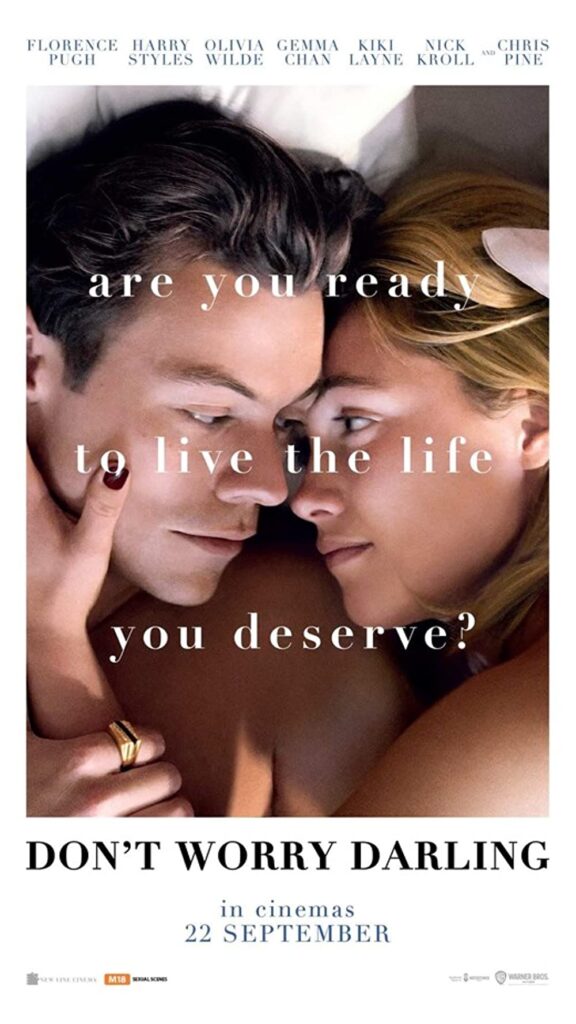Film Review of “Don’t Worry Darling” with Spoilers
By Ella Prieto, Staff Writer

Don’t Worry Darling (Photo courtesy of New Line Cinema and Vertigo Entertainment)
“Don’t Worry Darling” has finally been released in theaters across the country after its very dramatic making and media efforts. If you want to learn more about the drama behind the film, feel free to get caught up with this article.
A newer addition to the spectacle, however, was the movie’s terrible reviews, by critics and audiences alike. Currently, “Don’t Worry Darling” sits at only a 39% Rotten Tomatoes Score and a 48% Metacritic score. One New York Times critic even described the movie as “shallow” and lacking any real depth.
Hearing all of these reviews and following the drama behind the scenes of the film, I had to view “Don’t Worry Darling” to form my own opinion. On Sept. 23, the movie’s theatrical release date, I went to Gettysburg’s own Majestic Theater and settled in to watch what I was expecting to be a terrible movie. I, however, was pleasantly surprised.
While “Don’t Worry Darling” has some undeniable issues, it is still, undoubtedly, a good movie. The movie itself is gorgeous, with Director Olivia Wilde and Cinematographer Matthew Libatique producing beautiful pictures. The costumes, makeup, and music were also stellar, all very appropriately fitting of the 50s time period the movie was hoping to capture. The acting is also great as Florence Pugh leads the cast with gusto. Her co-lead, Harry Styles, is not as amazing, but I feel that he fulfilled his role well, just not with any particular strength. The main issue laid with the plot.
This is not to say the plot of the movie was not intriguing, it very much was. The movie revolved around married couple Alice and Jack Chambers, who live in the picture-perfect Victory Project. The Victory Project is a utopian society in California that has the aesthetics of America in the 1950s. It is led by a man named Frank, and his supportive wife Shelley. There are cookie-cutter homes, hard-working husbands with dottings wives, and flashy cars. Alice appears to be very happy there, until she starts to notice strange things: her friend Maragret becoming disturbed and then silenced, planes crashing in the sky, odd visions, and egg shells with nothing inside of them. Whenever she raises these issues to her husband Jack or her friends, she is told to stop jeopardizing what the Victory Project is accomplishing and chastised severely.
Alice eventually gets fed up with this, and tries to escape with Jack. Jack, however, turns on her, putting Alice in what appears to be a mental hospital where she receives shock therapy. While Alice is going through this, she has flashbacks of her old life. Here, the audience learns that the Victory Project is a simulation where men can put any woman in their life into so that they can live out their fantasy of being a strong man with a housewife. The shock therapy works on Alice at first, and she is put back into the simulation. It wears off quickly though, allowing her to kill Jack and escape back into the real world after outrunning Frank’s men and Frank being killed by his wife Shelley.
The storyline contains many twists and serves as an overarching comment on the male fantasy of a docile wife existing in the mid-20th century America. All of that is great and exciting to watch, but it falls apart on the big screen. The pacing for the movie feels off, with Alice taking very long to figure out what is wrong and escaping very quickly. Parts of the movie are never explained, such as the planes crashing, the random earthquakes, Margaret’s fate, why exactly Shelley turns on Frank, and more. Overall, the plot feels very rushed, which has been the main source of criticism about “Don’t Worry Darling.”
With that said, in no way do I believe that the film deserves the amount of criticism it has received. It is a decently solid film with a storyline that makes you think and reflect. Other films that have objectively worse storylines and directing, such as “Where the Crawdads Sing” and “Marry Me” which have fared better than “Don’t Worry Darling” with regard to criticism. I believe that most of the bad reviews have spawned from the bad press surrounding the making of the film and off-set drama. People have been overly harsh, which in turn has caused others to shy away from the movie.
I find that to be a shame, because it is a good movie. Numerous people worked hard on it and have produced something thoughtful and exciting. Please do not let the bad reviews turn you away from “Don’t Worry Darling.” Form your own opinions and theories about the movie, as I think it deserves that at the very least.
